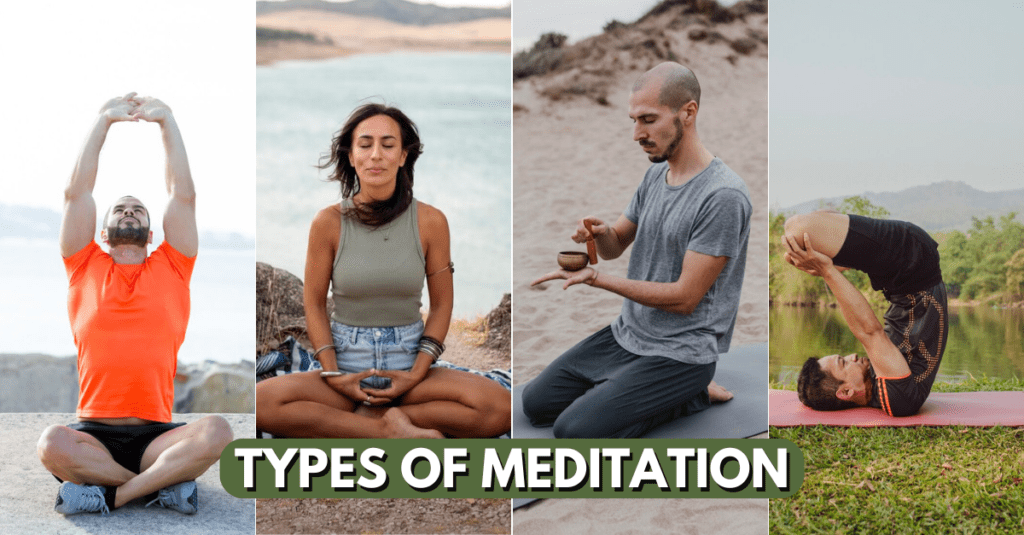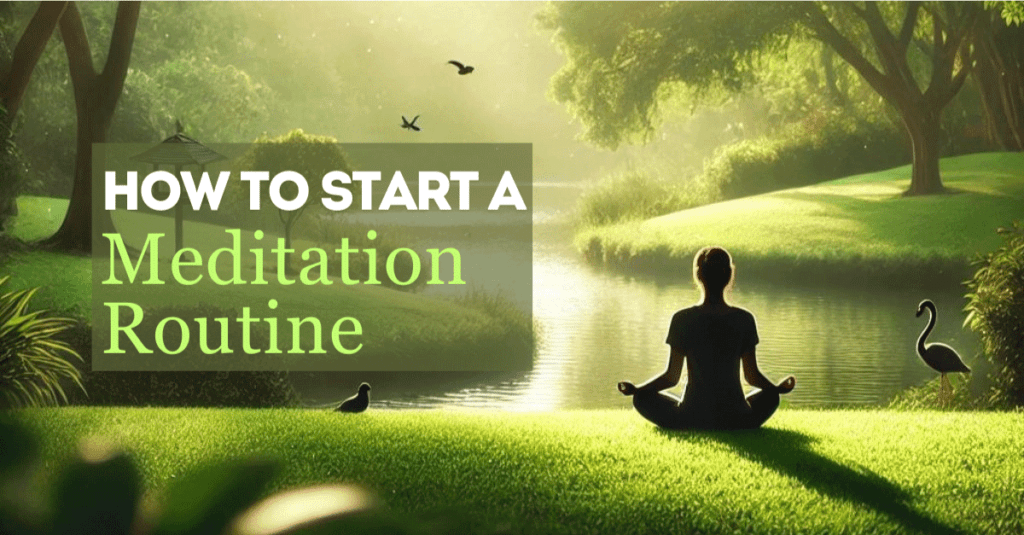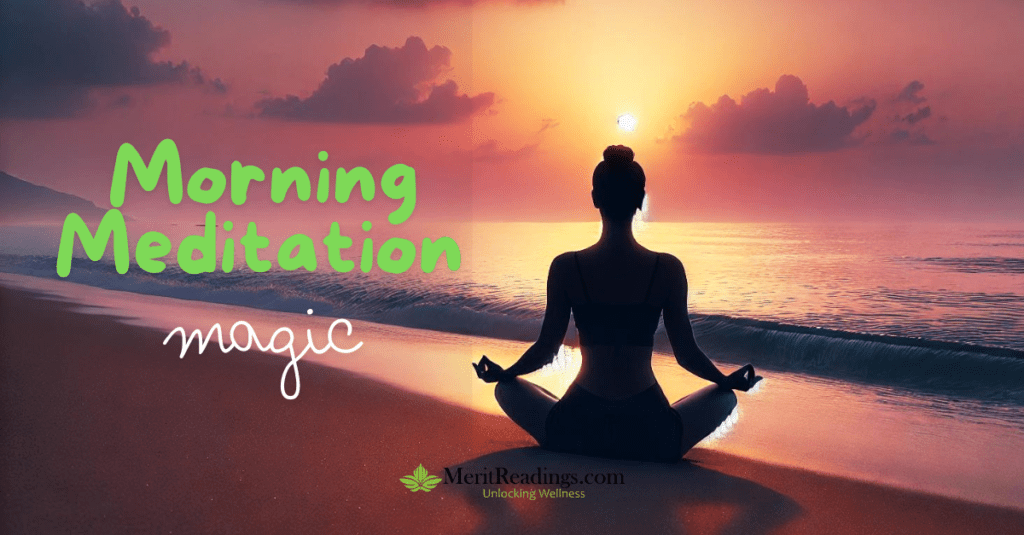Meditation has become essential for keeping our minds clear, emotions steady, and overall well-being in today’s busy world. Including meditation in your daily routine can reduce stress, improve focus, and bring inner peace. Despite its numerous benefits, many people find it challenging to begin and maintain a consistent daily meditation practice. This guide gives simple tips to help you start a meditation routine that easily fits into your life.
First, it’s important to know what meditation is and clear up any wrong ideas about it. The core of meditation is to observe your thoughts and stay present without trying to quiet your mind. Research shows that meditation has health benefits, including less stress, better focus, and stronger emotions. By meditating for just 15 minutes a day, you can start to enjoy these benefits.
Understanding Meditation
Definition of meditation:
Meditation encompasses various practices to promote relaxation, enhance focus, and cultivate mindfulness. These practices can include techniques such as focusing on your breathing, scanning your body, or visualizing peaceful scenes. They are all designed to help you feel calm and centred in your mind.
Benefits of regular meditation practice:

Regular meditation practice offers numerous benefits for mental and emotional well-being. It enhances mental clarity by sharpening one’s ability to concentrate and focus. Meditation is also helpful for reducing stress, aiding people in managing and easing stress more effectively with regular practice. Additionally, regular meditation practice improves emotional well-being by fostering a greater sense of self-awareness, emotional resilience, and inner peace.
Correcting false beliefs about meditation:
One common misconception about meditation is that it involves stopping thoughts altogether. However, meditation is about noticing thoughts without judging them and being fully aware of the moment. Meditation teaches you to notice and accept your thoughts and feelings as they arise, helping you stay mindful and present. It’s not about emptying your mind completely.
Understanding the different aspects of meditation can help you start your meditation journey with clarity and confidence. This will help you understand this life-changing practice’s real purpose and benefits.
Preparing Yourself
For beginners, it’s helpful to start by including meditation in your daily routines. One effective way to begin is by linking meditation with activities you already do, such as brushing your teeth. Setting a timer immediately after waking up can also aid in establishing a consistent meditation habit. This simple routine can be easily followed every day.
Next, find a quiet place where you won’t be disturbed. This could be a corner of your room or a comfortable chair where you can sit quietly and focus.
Starting Your Practice
- Start Short: Begin your daily meditation practice with brief sessions, gradually increasing the duration as you become more comfortable.
- Emphasize Mindful Practices: Focus on mindful practices, like paying attention to your breath or body sensations. Notice thoughts without judgment and gently guide your attention back to your breath.
- Manage Mind Wandering: When distractions arise during your practice, calmly refocus on the present moment.
Developing a Routine
- Commit to a daily meditation practice: Even a few minutes daily can yield benefits.
- Pick a specific time to meditate: It’s best to meditate at the same time every day, either in the morning or evening. This will help you establish a routine and turn meditation into a habit.
- Organize your time differently: Adjust your schedule as needed to ensure meditation remains a priority alongside your daily activities and responsibilities. Flexibility is key to maintaining your meditation practice consistently.
Staying Motivated
- Reflect on how meditation makes you feel good: Notice improvements in mood and stress levels.
- Track progress and benefits experienced: Keeping a journal or using apps can help track progress and reinforce motivation. Use journals or apps to monitor changes over time.
- Set realistic expectations: Know that meditation benefits take time to develop, so be patient and celebrate your progress. Consistency leads to lasting results.
Exploring Different Techniques

Experiment with various types of meditation to discover what suits you best. Body scan meditation focuses on different body parts, promoting relaxation and awareness. Alternatively, walking meditation allows you to practice mindfulness while moving slowly and deliberately. Guided meditation, using audio recordings or apps, can also help you navigate through the meditation process.
By trying out different methods, you’ll find the approach that makes meditation enjoyable and fulfilling for you.
Conclusion
Starting a meditation routine is a powerful commitment to your mental and emotional health. By integrating meditation into your daily life and following these practical tips, you can experience profound benefits over time. Remember, persistence and consistency are key. Explore self-discovery and peace through meditation.
In summary, starting a meditation routine can bring more peace, focus, and strength to face life’s difficulties. By understanding the essence of meditation, breaking myths, and implementing practical strategies, you set yourself up for success. Embrace each session as an opportunity to nurture your mind and spirit.
As you start this journey, remember that meditating brings you closer to a mindful and fulfilling life. Experience positive changes in your life with this life-changing practice. Commit to your practice, and let meditation guide you toward a brighter, more peaceful future.
FAQs:
Q: How to begin a meditation program?
A: Start by setting aside a few minutes daily to sit in a peaceful spot. Get yourself comfortable and concentrate on your breathing or a mantra.
Q: What to avoid while meditating?
- A: Avoid distractions like phones or noisy environments.
- Don’t judge yourself or your thoughts.
- Avoid forcing yourself into deep relaxation.
Q: How do I know if I’m meditating correctly?
A: During meditation, you should experience a focused awareness of your breath or chosen object, with minimal distractions. Afterwards, feeling a sense of calm and mental clarity is common.
Q: How do I start effective meditation?
A: Establish a routine, stick to it, and consider using guided meditations or apps to help. Be patient with your progress.
Q: What are the 3 R’s of meditation?
A: Relax: Allow your body and mind to relax deeply.
Release: Let go of tension, stress, and negative thoughts.
Rejuvenate: Feel refreshed and renewed after your practice.
Q: What are the mistakes for beginners in meditation?
A: They try very hard to clear their minds completely. They become frustrated with wandering thoughts. They give up too quickly because they feel like they’re not making progress.



